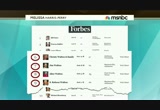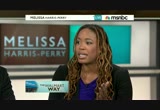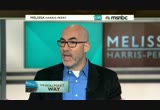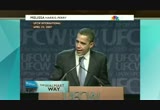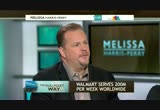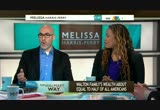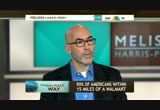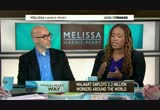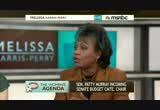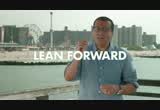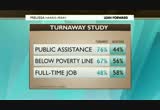tv Melissa Harris- Perry MSNBC November 25, 2012 7:00am-9:00am PST
7:00 am
workers at the world's largest employer stepped out from behind checkout counters and out of the loading docks too as they chanted stand up and live better. according to organizers, hundreds of retail workers walked off the job across 46 states and were joined in protest with union members and activists o call for a living wage and improved working conditions. known for being staunchly anti-union, walmart dismissed the protests as "grossly exaggerated" saying that the organization backing the protests, our walmart, "was unable to recruit more than a small number of associates to participate in these made for tv events." with more than 1.4 million u.s. employees, walmart's cost cutting, low overhead structure has revolutionized the labor practices for 50 years. as the largest and most successful retail firm in the country, walmart sets the standards for the industry that represent nearly a quarter of the american labor force.
7:01 am
those standards have an effect all along the supply chain and wield huge influence over the nation's overall standard of living and economic output. that retail revolution has been based on the walmart formula to provide the lowest prices any time anywhere. helping, as they say, people around the world to save money and live better. there are certainly not just americans but millions of people across the world that depend on those low prices. 200 million customers a week in fact. considering walmart's bottom line alone, i've got to say their model seems like it works, at least by one measure. just last year, walmart earned $16 billion with a b, dollars. that helped the walton family to live better for sure. grab your forbes 400 list. numbers 6, 7, 8 and 9 each members of the walton dynasty. together they're worth more than
7:02 am
$100 billion. hold on. let's put this in perspective. that means the walton family's wealth is nearly equal to that of the bottom half of all americans combined. while the u.s. economy and millions of american families have been struggling with unemployment and underemployment, net sales for the walton family has grown more than $70 billion since the start of the great recession. now, a lot of those families in the bottom half struggling with underemployment are in fact walmart workers. a leaked internal document revealed that the base pay at the sam's club stores can be as low as $8 an hour. that's a mere $16,000 a year. with wage increases in drips and drabs as low as 20 or 40 cents per hour. one study found that walmart employees in california were nearly 40% more likely to use public assistance to make ends meet. costing the state's taxpayers
7:03 am
$86 million annually. that means people with jobs in that state are still having to turn to the public safety net to get by. because working at walmart is not sustainable employment. if walmart became the standard across all retailers in california, taxpayers would have to subsidize their fellow workers with an additional $410 million a year. yet according to a study by the policy development and advocacy administration, it would only cost a typical shopper $17.73 a year if walmart paid its employees at least $25,000 a year. if that became the standard, more than 700,000 americans would be lifted out of poverty. that's the key here. because while walmart may not be alone in its low-wage minimal labor benefit practices, as the nation's biggest player can set the standards that make the
7:04 am
difference. as the venerable sam walton once said, we work together, we'll lower the cost of living for everyone. we'll give the world an opportunity to see what it's like to save and have a better life. with me today, dan shah letterman of making change at walmart. carmen wong a personal finance expert and president of ulta wealth management. peter goodman, executive business editor for the huffington post and heather mcgee from the progressive think tank. nice to see you all. >> thanks. >> walmart has said not such a big deal. a couple dozen people walked out. we had record profits. how do you respond to that poo pooing of the labor pushback. >> i wish i could say i was surprised. this is walmart's typical response, to ignore the fact that there are problems inside
7:05 am
of the store. hundreds and hups of workers went on strike across the country. they went on strike because walmart continues to illegally retaliate for those who want to speak up and make a change at walmart. these workers went on strike even the days leading up to it when walmart was threatening them with termination, threatening with some being sued for lost revenue. these workers still had the courage to stand up. on top of that, we just saw an incredible outpouring of support from the community that i've never seen anything like in the 20 years that i've been working as an organizer. so walmart can continue to ignore what's happening here. but there's something much bigger happening here. what these workers are fighting for is resonating. what they're standing up for, everybody knows how important it is that when our largest private employer is attacking workers for wanting free speech. we have to stand up against that. i think we saw that on black friday. >> is this the beginning of a movement with momentum? i love this point that even if
7:06 am
it's not every single worker, even if they didn't shut down walmart, nonetheless, you have this sense of a shift in the discourse for the first time. this is part of the narrative about what occupy does. it helps us to see things that are invisible to us. walmart is good because it creates low prices. yet, walmart also create a circumstance where taxpayers are subsidizing walton's billion dollars of profits. is this the moment when we start to see the ship turn. >> absolutely. i think the key has been throughout the economic pain that the american people have been feeling since the great recession. the conversation has really lurched between because of occupy, the role of wall street, the corporations and when the right has the control of the conversation, it's really a conversation about taxes and spending as if that's what's making the american people have less and less take home pay. as if that's making a third of all the jobs in the country below wage jobs. i really think that the more that we can have a conversation about the employer role, it
7:07 am
takes business, it takes government, it takes individuals to sort of create a contract in the country. employees simply walked away from that bargain. we have not had accountability at all. >> we're with demos. you tried to quantify and move the focus to employers in part by telling whaus would happen if this employer behaved in a different way. what's the take away point from the study sm. >> we wanted to ask the question, we know that the government could do a lot more to put people back to work. couldn't private sector do more? we looked at the retail industry at large. we took the largest retailers as a whole, the big chain stores and said, okay, approximate they lifted the wage floor for the most underpaid workers to $25,000 a year, what would be the economic impacts. we found it would create by putting more money in the job creators of the country, the low wage workers who spend every time they get.
7:08 am
it would create 130,000 jobs. it would put $5 billion back in the pocket of the same retailers because surprise surprise when people spend money, they're spending them in the retail sector. it would lift a million and a half people out of poverty and near poverty and be an increase in the take-home pay of 5 million people. all of that, if they passed on the cost to consumers of the wage increase, which they don't have to do but they did it, this is the question. would we see inflation in prices? no. we found they passed on 100% of the cost -- if we look at this as a business model, it makes sense to pay your workers more. >> this is the henry ford model. >> if you think about it for consumers, who is going to pay for the $5. shirt at some point somebody pays for it. exploitation of wages here and
7:09 am
overseas. you're talking about pumping more money into the economy and getting millions of folks off of federal assistance. so many folks at walmart have to lean on food stamps and lean on federal assistance. this would get rid of that. if we had to pay an extra dollar for that shirt, i think we're okay with that. >> back it up on the supply chain. if you're talking about that $5 shirt, it's made a couple of different ways. part of it is by paying the retail associate, the checkout man or woman, a low wage, but it backs way up. who are the other folks -- >> all the way down the production line to who is actually making the shirt. where does the material come from and advertising costs. if you think about it, so many of the folks who shop at walmart, work at walmart who have family who works there. it seems like great business decision to lift up everybody together and have more sales. >> yet, peter, that feels that exactly why this organizing is so tough. >> right.
7:10 am
>> living in louisiana, there are whole communities, if you're going to boycott walmart, you're going to boycott grocery shopping, right? >> we saw this on friday. i sent a reporter to dallas, one of the major scenes of activity in terms of black friday strikes. my reporter ran into a woman who works at walgreens. it was her day off. she was going to walmart to buy stuff. i feel a sense of solidarity. i'm delighted to see that my fellow low-wage service sector are standing up for their rights. i wish them well. but now i'm going to buy a tv because i don't make much money at work either and this is the day when i can avail myself of the sales. the toughest thing, i applaud the work that dan is doing. i hope this is the beginning of a movement. it is. as we all said, incredibly important that people particularly at the lower end of the economy have more money to spend. that's good for the economy. those are the most desperate people. the people who work at walmart are by and large people who have
7:11 am
that job. they pay them a living wage. they're hoping for better. it's very tough to get people to think in terms of beyond today. today involves how do i keep my paycheck. if i'm going in the door, this is where i get the low prices. >> as we go out, i want to listen a little bit to walmart employees themselves saying why they were making this decision to go on strike. this point is so critical, living in louisiana where the loss of our environmental integrity is tied up for example. yet oil is also the thing that feeds the family. whenever we have the relationships to the troubling industries, it gets complicated. let's listen as we go out to walmart workers themselves. >> our fellow associates have to use local food pantries. >> because i'm tired being discriminated by management. >> because we have to depend on
7:12 am
each other check by check and borrow money from each other to make it to the next week. >> stand up, live better. >> how does this thing work? oh, i like it! [ garth ] sven's small business earns 2% cash back on every purchase, every day! woo-hoo!!! so that's ten security gators, right? put them on my spark card! why settle for less? testing hot tar... great businesses deserve great rewards! [ male announcer ] the spark business card from capital one. choose unlimited rewards with 2% cash back or double miles on every purchase, every day! what's in your wallet? here's your invoice.
7:13 am
7:14 am
just two aleve can keep pain away all day. experience theticket to pressure-relieving comfort of tempur-pedic, and sleep risk-free with sleep train's 100-day money back guarantee. get 36 months interest-free financing: no down, and no interest for 3 years. plus, get free same-day delivery. sleep train's 100-day money back guarantee, interest-free financing, and free delivery? that's the ticket! sleep train's ticket to tempur-pedic ends sunday. ♪ sleep train ♪ your ticket to a better night's sleep ♪
7:15 am
. if there are workers who can't get the health care they need, who don't receive the wages they deserve, who are divide sbod two tiers, even when they do the same work, that's a threat to workers everywhere. that matters to all of us. it isn't about attacking walmart. this is about demanding more responsibility from an extraordinarily profitable and successful company. it's about reminding that company that they have a stake in the communities where they set up shop. that the well-being of their workers and other workers should matter to them. that opportunity and justice should factor into their bottom
7:16 am
line. that's not too much to ask for. >> that was then senator barack obama in 2007. speaking to the united food and commercial worker's union about the grievances with walmart's labor practices. at that same year they called the company a case study in what is wrong with u.s. labor laws. little has changed for labor under the obama presidential administration. in fact, at a federal level, few have even commented on recent labor organizing against walmart. while on a local level, whether it be boycotting or purposefully spending your money at a retailer, shopping at walmart is aligned with certain political statements. yet, the majority tends to have few choices about the matter. back with me at the table is the panel. dan, let me ask a little about this. it does feel to me like a couple of retailers the choice to shop there or not shop there. a political statement. grover norquist is tweeting,
7:17 am
avenge twinkie. shop at walmart today. >> now if you're a walmart shopper, you're somehow pro -- how does this happen? >> you know, walmart workers taking the stand has certainly brought an amazing debate. that debate includes tweets like that. the thing that's been much more exciting is a larger debate that's happening. walmart is the largest employer in the country. the debate that's happening is -- as said by then senator obama, what is the responsibility that they have as being the largest private employer. if we think about other times when other companies were our largest employer. we think about gm. the kind of jobs gmt created and -- the middle class. our economy shifted. we now have a retail-based and consumer-based economy with 70% of the gdp based on consumerism.
7:18 am
what are the jobs creating a middle class and healthier economy? we would say that walmart needs to play a major role with 1.4 million employees. >> your point isn't to put them out of business. as you make this point, i was thinking back to the moment when you have civil rights activists sitting in at woolworth counters. those are extremely localized. woolworth for the kind of economic power that it had at the time in greensboro isn't a walmart. it doesn't have that sort of broad international multibillion dollar impact. so there's just this part of me thinks have we shifted to an economy, not a ford car's based economy, it's a walmart-based economy. they're huge, multinational, multibillion. can workers still have a voice in that kind of -- >> it's tough. in the ford model, you enable
7:19 am
that worker to go home to their community and spend their dollars in the community their spending, they would use the car they can afford to drive to the shopping center where the products would mostly be made in the united states using material sourced in the united states. nowadays, there's a feeling. i think walmart effectively plays on this. it's sort of implicit narrative in the we deliver the lowest prices. there's an understanding, i think, by most consumers that a lot of not very nice things go into delivering those good prices. the alternative is let's face it, if the walmart worker got paid a lot more money. some of that money, and i think it's significant. the study highlights it. would benefit the american economy. not to the same degree that similar sort of market stimulus would have back in the days of -- >> i do want to look. the institute -- if we raise the minimum wage by $2 in the next two years, we'll add $40 billion
7:20 am
of instant spending money, not money into savings accounts. instant spending money to this economy. it would be a tremendous stimulus. >> true. but some that of would go to best buy where samsung would pull products from an asian supply chain. i mean, i think the consumer understands that. >> peter, let's look at exactly that. part of what walmart has done in its practice, part of it is the low wages and the question of raising it for more consumption. also look at the fact that walmart has generated trade deficits. when you look at this -- this blew my mind. this is the size that walmart has in our economy. the walmart trade deficits with china eliminated nearly 200,000 u.s. jobs between '01 and 2006. just walmart's decision, right. just that. so on the one hand, like yes, you've got this issue of how these supply chains are connected. but it feels like how else do you lift yourself out of that sort of thing? it's not just sort of what's
7:21 am
good in a moral or a ethical sense. there's an economic what good is going on. >> the giant corporations do live in this bubble. the bubble where it's okay to do what they do mord to make more profits or to give bonuses or whatever. i'm not anti- -- in any sort of way. really just understanding that they believe that the hourly workers are super transient. okay, you want to leave. we'll get somebody else. all these people are happy. these people are are are cogs in that wheel. i think what you're doing and the fact that we're discussing this and adding pressure to them in that way hopefully will get them to think more about it. >> what's amazing, rather than seeing the workers standing up and saying this company can be something even better than it is, we love this company, we just want to see it better, rather than seeing those as something they want to invest in, it's something they're attacking. the idea that people want to stay somewhere, like the response that i've seen, why
7:22 am
don't you get another job. these folks have been incredibly powerful in saying, no, this is a bigger problem. if we don't change walmart, we're not going to change anywhere else. people are really taking a stand here to say like we want to see something different. it's really powerful. >> this is an important point. this happens for those who are critical of political system. if you're a moderate republican within the republican party and saying the way you're behaving is bad for the party, the response is you're a hater, get out. or if you're a critic of the president from the left, you know, out of the coalition, you go -- so this point of saying, what we're asking isn't shutting them down. it's getting a different set of choices. i want to talk about how the key change to labor practices in america might rest with us as consumers. i want to ask you about costco when we get back. [ male announcer ] if you suffer from heartburn 2 or more days a week,
7:23 am
why use temporary treatments when you can prevent the acid that's causing it with prevacid24hr. with one pill prevacid24hr works at the source to prevent the acid that causes frequent heartburn all day and all night. and with new prevacid24hr perks, you can earn rewards from dinner deals to music downloads for purchasing prevacid24hr. prevent acid all day and all night for 24 hours with prevacid24hr.
7:25 am
time for citi price rewind. because your daughter really wants that pink castle thing. and you really don't want to pay more than you have to. only citi price rewind automatically searches for the lowest price. and if it finds one, you get refunded the difference. just use your citi card and register your purchase online. have a super sparkly day! ok. [ male announcer ] now all you need is a magic carriage. citi price rewind. buy now. save later.
7:26 am
because i'm tired of working for a company where workers get cheated and cheaters get rewarded. >> because i want a better life for my son. >> because my management suspects me in front of customers. >> stand up, live better. >> those some of the walmart workers associated with our walmart. but before there was our walmart, city councils across the country have gone up against the big box giant to keep its low prices and even lower wages out of their communities. from massachusetts to illinois, to california, americans have said no to walmart opening doors in their neighborhood for years. community-driven consumer choices may well be the key to changing our national labor practices. today i want to ask about this. now we have a national view. but the language of, say no to walmart and yes to costco is one i'm familiar with over the years. i want to ask two questions.
7:27 am
one, why is it that costco is able to do what it does with good labor practice and feel that out but also is there a way to start moving the model toward the costco model with eliminating the ability of ordinary folks to get the products they need. >> costco, no question. does not see turnover as a benefit to them. therefore, much higher wages, much higher benefits. really invest in their employees, customer service is really important. you know, if you look at the popularity in how people talk about their experience at costco, dramatically -- >> it's like a costco cult. those who love it, love it. yes, yes. >> people have a good experience there, right? so i think the challenge to walmart is as the demos report shows, there is another way. i would argue strenuously that walmart, who revolutionized
7:28 am
retail and has been in many ways quite creative and innovative, could be innovative in another way. it would be innovative in a way to rethink this race to the bottom and rethink the way it's happening. there was a study done by a harvard professor that showed for every dollar invested in the hourly rate of a retail worker would actually get you anywhere from between $4 and $28 per square foot back in additional sales. there's a real connection between taking care of your people and your people taking care of you. et cetera. then the other thing that i think other retailers are doing well is the staffing levels. walmart is dramatically understaffing. i hear stories all the time about workers who talk about how somebody wants to go in and buy a hawaii item product at a walmart, they can't open it up. so they miss the sales. >> be helpful on the floor experience. >> that's the difference between
7:29 am
as professor at m.i.t. says between seeing labor as a cost to be minimized and seeing your workers as an asset to be maximized. this is the question, what is a company? i think of my organization and the people who work there are the organization. we're not a publicly traded company. that's, i think, where the tension comes in. it's where you identify the value that your company is. is it the people who go to work there every day who make the decisions on the floor who are the face of your enterprise to the customers or is it the sort of invisible shareholders? and time after time, we've seen in this new economy management choosing shareholders oftentimes distant people who are just clicking on ameritrade over their workers. we looked at the amount of money that the retailers, the large retailers as a whole would need to do this new wage floor we were talking about in our study. was about $20 billion. just the top ten retailers spent more than that.
7:30 am
$4 billion more than that last year purchasing back their own stock from the market. just to inflate -- >> which is something that's great for investors. great for executive comp. compensation. that money could have gone back to the workers with all the productivity gains. >> there's a parallel there between as we face a fiscal cliff, how we think about what our citizens. i love this, is labor a cost to be minimized or the workers that we maximize. it's the same sort of questions. do we invest in health care, education because our citizens are our great american resource or do we think let's spend as little as possible and leave people as out there as they can. >> whoever realizes and -- >> whoever gets this. >> and realizes this and the bad press and people can go with wallets or say i choose to shop someplace else. somebody says i'm going to treat my people great, they're part of the advertising campaign. this is a great moment.
7:31 am
i always keep bringing it back to good business practices. >> when we come back, talk a little bit about black friday. are we in the red? more after that. [ man ] ring ring... progresso this reduced sodium soup says it may help lower cholesterol, how does it work? you just have to eat it as part of your heart healthy diet. step 1. eat the soup. all those veggies and beans, that's what may help lower your cholesterol and -- well that's easy [ male announcer ] progresso. you gotta taste this soup.
7:32 am
that's what may help lower your cholesterol and -- well that's easy online outfit piccolo headphones buy now broadway show megapixels place to sleep little roadster war and peace deep sea diving ninja app hipster glasses 5% cash back sign up to get 5% everywhere online through december. only from discover. get 36 months interest-free financing through thanksgiving weekend at sleep train, and save $400, $500, up to $600 on beautyrest and posturepedic. even get 3 years interest-free financing on serta icomfort and tempur-pedic. plus, free same day delivery, set-up, and removal of your old set. when brands compete, you save. but mattress price wars ends sunday, thanksgiving weekend, at sleep train. ♪ sleep train ♪ your ticket to a better night's sleep ♪
7:33 am
7:34 am
instore and online, right now. where prices have been cut, chopped, and sanded... ...on the most powerful tools that cut... ...chop... ...and sand. so we, or somebody on our list, can do the same. more saving. more doing. that's the power of the home depot. get a special buy on a ryobi 2 piece lithium ion kit for just $99. right after the turkey has been devoured shall the pies savored, the dishes washed and the relatives gone home, many americans have already geared up for another annual frenzied ritual. black friday. the commercial brainchild of department stores from sea to shining sea that amounts to valentine's day, mother's day and a baby shower all wrapped into one big shopping bag. it puts all other holidays to
7:35 am
shame. it's a pre-planned outburst of spending bliss. many stores started even earlier this year. opening up earlier on thanksgiving day than ever before. it's a real celebration at walmart on thursday night where the retail giant processed 10 million register transactions, ringing up 5,000 items per second. by friday morning, the walton family hawked 1.3 million televisions. 1.8 million towels. 1.3 million dolls and about 250,000 bicycles. i'm not exactly sure how much all those towels do for the economy at large, but i would say it's a pretty good four hours for walmart. they say it was the best ever. overall, though every year black friday's unapologetic celebration of commerce can't add up to annual sales, bringing retailers into the black. between black friday, small business saturday, and cyber
7:36 am
monday, an estimated 147 million shoppers who will opened their waumts putting smiles on the faces of ceos across the country who are hoping this holiday season's optimistic forecast comes true. the national retail federation is predicting a 4.1% gain in sales this year over 2011. amounting to about $586 billion that could be good news for our economy overall. consumer spending accounts for 70% of the total u.s. economic output. retail puts 1. -- some call it a daily barometer for the nation's economy. if consumers are happy, they often are spending. october is consumer confidence index came in at 72.2. the highest level in five years. so increasingly, american consumers are pretty optimistic. they've been bringing that enthusiasm to their local checkout counter where one in
7:37 am
four americans goes to work. retail supply jobs to 42 million americans. but according to the bureau of labor statistics, the typical retail salesperson earned $20,990 last year. that's below the official government poverty threshold of $22,113 for a family of four. it has been that way for some time. during the five years through october 2011, average weekly earnings for private sector workers have increased by a mere 12 cents. although american consumers have been the engine of the u.s., not to mention global economy for decades, when 25% of american wage earners are making a pittance, confident or not, the consumer may not be able to bear the brunt of our economic future. but can consumer confidence fix the economy? that question next. but lately she's been coming in with less gray than usual. what's she up to? [ female announcer ] root touch-up by nice'n easy
7:38 am
has the most shade choices, designed to match even salon color in just 10 minutes. with root touch-up, all they see is you. designed to match even salon color in just 10 minutes. try running four.ning a restaurant is hard, fortunately we've got ink. it gives us 5x the rewards on our internet, phone charges and cable, plus at office supply stores. rewards we put right back into our business. this is the only thing we've ever wanted to do and ink helps us do it. make your mark with ink from chase. but with advair, i'm breathing better. so now i can be in the scene.
7:39 am
advair is clinically proven to help significantly improve lung function. unlike most copd medications, advair contains both an anti-inflammatory and a long-acting bronchodilator working together to help improve your lung function all day. advair won't replace fast-acting inhalers for sudden symptoms and should not be used more than twice a day. people with copd taking advair may have a higher chance of pneumonia. advair may increase your risk of osteoporosis and some eye problems. tell your doctor if you have a heart condition or high blood pressure before taking advair. if you're still having difficulty breathing, ask your doctor if including advair could help improve your lung function. get your first full prescription free and save on refills at advaircopd.com. that's right. so it's like i won. sure. oh my gosh i won!!! i won!!!
7:40 am
7:41 am
hey america. how are you feeling? about the economy, i mean. are you feeling good? like maybe this good? maybe you're feeling this good? i know you're feeling this good. this was the scene on black friday. people ready to shop by any means necessary. people ready to spend. these people you are seeing here, they have got to be feeling good about something. the economy? but how do we quantify this kind of good feeling? of all the math we use to figure out how well the economy is doing and how fast it's recovering, one of the strangest, oddest, weirdest measurements is consumer confidence. it's an un -- not an unemployment rate or a number of homes purchased. but it is a number. not one we can agree what we're measuring. we told you in the last segment, the consumer confidence index for october was 72.2. the highest in more than four years. it was based on a monthly sauer vase by a nonprofit organization
7:42 am
called the conference board. get this. they're not the only ones with a number. according to a survey done by the university of michigan and thompson reuters, the consumer sentiment index is at a five-year high at 82.6 in october, 82.7 in november. whether you want to go with 72.2 or 82.7, you just got to ask out of what? out of 100? 82 what? it doesn't really work like that. it's like celsius and fahrenheit of consumer economics. all quantifying an emotion. really it's about how we as consumers are feeling. what tangible information can we derive from that. back with me making change at walmarts dan slad man. carmen wong and heather mcghee. carmen, what is this consumer index and why is it so important. >> when the index is high, we want to buy. that's what wall street wants to
7:43 am
hear. just to give a comparison. when the recession was absolutely at its worst, consumer confidence was in the 20s. when at its best before the recession, it was in the 90s. you're close when you come to 100. you want the highest number possible. what is this that we're measuring? we're measuring our ability and sense to go out and spend more money. this is really what the confidence is really tied to. here's the thing. we've had good job numbers and housing. that's what consumers need to see. they need to see their homes going up in value and they need to see the unemployment numbers going down. that's what they've seen. the consumers are not shaken at all by the cliff talk. good for them. a lot of shenanigans. >> really paying attention to do i have that job. is my home going up in value. is it happy to spend more? what i worry about when consumer confidence goes up, we start with the bad behaviors again. our savings rates have gone back
7:44 am
down and our spending continues to go back up. we've kept credit card balances in general low. but we fall into that i'm going to spend my way to happiness scenario. >> i don't want to miss that point. it's a bit of what we were talking about earlier. if you're a working person, a little bit more money. you go out and spend it. that's great for the economy. if you're a personal finance, if i were doing that, my mom and dad would say to me, don't spend your last margins. there's a kind of disconnect between on the one hand our confidence to spend but what my act should be good for personal finances. >> the best case scenario is not to be overconfident. be confident to spend within confines where you're also saving. we're about at that point. what we don't want to see, when the numbers get over 80, we again see no savings anymore. we see overspending. >> consumer confidence is not consumer spending. confidence is like a mood ring. it's sort of --
7:45 am
>> purplish. >> right. and the truth is, that we can feel a certain way and yet not behave in another way because the fact is, that we've still got one out of every five mortgage holders in america owing the bank more than their home is worth. even the people who have gotten jobs have generally traded down in terms of the wages and the basic -- the country at large is not running around sell operating that the recession is over. in fact, half the country, before the recession had liquid assets of $5,000 or less and learned that catastrophe can arrive in a heartbeat. a lot of people still don't have the credit to participate in whatever sort of consumer good feeling bonanza is upon us. you can drive a lot of consumer spending with the people at the top of the economic pyramid going out and spending a lot of the people in the middle and at the bottom end are people who haven't been a able to replace the washing machine that broke four years ago or living with neighbors because they've had to
7:46 am
rent out their house while they desperately tried to keep it. there's a lot of complexity to this. i think we'd be wrong to look at this number and say, okay, recession over, victory upon us. >> the consumer confidence index is an ago gait number. when it is broken out by income, you see that people making $50,000 have about a 30 percentage point higher consumer cough dense index than people making $25,000. that makes total sense. we're not one economy. we are two economies. we're two americas as it were. in terms of the entire income gain since the recession, the income growth has gone to the top 1% of the country. things like wine and jewelry, and teex and stocks at record highs whereas most people are still struggling with the only asset they have, their home. we have a higher mortgage market. we've got the fact that people
7:47 am
who have great credit are able to get basically free money whereas, credit is much tighter for working folks. >> this is part of that recovery in the housing market, right, isn't tied to the fact that folks at the very top are able to buy bigger or second homes whereas ordinary folks are still under the circumstance of bunking up. >> don't be a renter who has no assets because actually, the demand for apartments has pushed rents sky high to where in some places actually more expensive to rent than to buy. it's an incredible inequality. >> if we look at the jobs are lost in '08 and the jobs being created. by far, they're low-income jobs. we're building the broader, the two americas getting bigger and bigger and bigger. so that is just having a huge impact on consumer confidence and people able to 70% of our gdp is people spending, this is a different kind of cliff we're creating.
7:48 am
>> when the walmart ceo makes in an hour what his employees make in six months, you have high confidence for some and not others. we'll bring in this housing boom in a second. is there really a housing boom? we'll explain when we come back. can i help you? i heard you guys can ship ground for less than the ups store. that's right. i've learned the only way to get a holiday deal is to camp out. you know we've been open all night. is this a trick to get my spot? [ male announcer ] break from the holiday stress. save on ground shipping at fedex office.
7:51 am
given how intertwined the burst of the housing bubble is is from the recession data, the housing market is one of the most important pieces of data that they look to for signs of recovery. that may be wow. in october, not only did housing starts rise, the rate of breaking ground on new homes is up 42% from last year. overall, it's at a four-year high. ha does it say when people are feeling this free to spend money on perhaps the biggest purchase that most of us ever make.
7:52 am
a home. peter, what's the connection between the consumer confidence an the housing market? >> i think there's a direct connection. there's a feeling that the foreclosure crisis is still happening, it's slowed down. prices are coming up. volume is going up. that's a good thing. but let's remember, the housing market is not just a market as in supply of thing, demand for a thing. what's the price. it is the repository for most people's savings. it's the biggest asset most people will ever own. it's a thing that small businesses use to borrow against, to go out and take a little risk. hire people and put themselves in a building. there's still, we have a long way to go. have we hit bottom? seems that way. a lot better than a year ago or god forbid three or four years ago. we have a long way to go before fls a sense people can look to the biggest repository savings. >> we're climbing, climbing. we keep hearing every day, we're climbing up to the edge of a cliff. on the one hand it feels like consumer confidence is not
7:53 am
immediately impacted by the question that's emerging. but i got to believe it's having an impact and as long as the partisan bickering remains, it will continue to have an important impact on the economy. >> both parties in the run-up to the election told us with differing narratives that we had a problem. we had dysfunction in washington. the republicans said well, we've got all this uncertainty and business feels they're being demonized and don't want to invest money. the democrats essentially said we have tremendous inequality and the middle class isn't stable. until we build a middle class, no thriving economy. we're still there. we voetded for the status quo. the republican position is still, let's not give this president any victories. let's not participate in real sustaining economic recovery and the president, yes, he's stronger than he was before the election. but he's still somewhat constrained. i think the public understands there's a lot of uncertainty. we may go over this cliff.
7:54 am
some say it's not a cliff. it's a hill. certainly it would be good to have higher tax rates for wealthier people. it might not be a long-term catastrophe. we get some reform out of it. let's remember, the deals that we're discussing to avert the cliff involve balancing a budget deficit that was a lot of fun for people on the take, the military defense contractors who got paid off the books. >> right. >> taking health care away from poor people. >> the impact that we're seeing now may not be -- the consumers may not see it through them but we're seeing it through the banks and business who is are right now still being very conservative about who they're lending to and how they're doing business because they are spooked by these talks. much more so than consumers. >> why don't you see the business community, particularly in advance of the holiday shopping season, say, you know what, you guys are going to have to signal that you're going to resolve this because these are the weeks in which we make all our money for the year. we need consumers happy.
7:55 am
we need them shopping. >> because those businesses are run by executives who don't want to pay higher taxes. it's not that complicated. >> we have jeff i am he will saying we need more revenue. you want to pay capital gains that equate -- there's silence from the business community when you talk to them. >> exactly. that's sufficient to explain it. ladies, you guys are stick around. we have a lotulelei happening on the women's agenda. thank you to dan and peter. thank you for all of your work with all mart. we'll keep our eyes on this. >> thank you. >> wasn't a one good friday sort moment. coming up, if you think 2012 was the year of the woman, wait until 2013. professor anita hill joining the nerdland table next. with verizon.
7:56 am
7:59 am
welcome back. i'm melissa harris-perry. lawmakers in washington, d.c. are still trying to get a deal done before we all go over the proverbial fiscal cliff at the beginning of 2013. if the debt ceiling debacle of last year was an indicator, it ain't looking good. the fiscal cliff will affect many. how does it look different if you're at the edge of that cliff and you're a woman? with the recession having a disparity affect on women, the fiscal cliff can't look much better. economic security is nong lower guarantee for women and their families. 26 million women have trouble paying for food. 46 million women have trouble paying for health care. 32 million women have trouble paying their rent. 65 million women are unable to save for the future. on to those numbers, the realities of ee quest ration or cutbacks is because lawmakers don't come to an agreement before the end of the year. if a deal is not reached, it's
8:00 am
not just the defense budget, no. domestic programs will be impacted as well. with $500 billion in cuts, some of those are the very programs that disproportionately impact women and their families. it includes 2300 national health research grants. almost 100,000 kids losing headstart services and 80,000 losing child care assistance. add medicaid cuts and which may have to be yielded to get republicans to concede to tax hike. nearly one in ten women between 18 and 64 rely on medicaid for health coverage and social security that entitlement support. about three in ten women, age 65-plus. without it, half of the women over 65 would live below the poverty line. these issues are huge. they may further negatively impact the futures of mothers and daughters and granddaughters. politicians immediate to take heed. if these issues which are key to
8:01 am
the women's agenda aren't dealt with effectively, those same women that voted you into office this time around can vote you out the next. at the table, rebecca traceter, author of big girls don't cry and senior writer. carmen wong. >> erin ka moan. and back for a second visit to nerdland, anita hill, professor of social policy law and women's studies at bran dies university and author of reimagining requality. >> great to have you here. professor hill, i'll start with you. we recognize the fiscal cliff may not happen in precisely these ways. but it looks like women are particularly vulnerable with the cuts that could occur. >> the economic vulnerability of women is something we talk about. these really do present stark, stark realities to consider, we
8:02 am
started because in around 2008 what kind of cuts are being made in the budget. so now we're revisiting in as we look at the future of what's going to happen in the next few weeks. what i'm a prayed of is if we don't do something even more extreme cuts to think like two things. child care for example. or housing assistance. will put women in further jeopardy. we really are already as your numbers indicate, at a critical juncture for being devastated. >> i feel like rebecca, when we look at the things we have difficulty paying for, food care and rent or ability to save for the future or the loss of headstart and child care, we're reminded that when women are trouble, there's a whole lot of folks in trouble along with them. >> one of the things that the
8:03 am
numbers unfortunately, give us the chance to discuss are the multiple angles from which women are hit and the systemic problems that put women more atrice being. when you talk about the headstart numbers, the hundreds of thousands of kids who won't have headstart which makes it more difficult for their parents and mothers to do their jobs, earn their living, work. >> how can you go to work if you -- >> especially if you're already a low-income wage earner. it's also true that women are more likely to hold the public sector jobs. it cuts 30,000 jobs for teachers and administrators and aides. those will be largely women. you're already looking at an economy that's been devastated by a foreclosure crisis where women were more vulnerable, especially women of color who were more than 2.5 times more likely than white men to have a subprime mortgage. so you are -- you're also looking at a systemic issue, which is women weren't allowed to build wealth by owning their
8:04 am
own property until four decades ago. between the history of inequality and the current sets of inequalities and our failure to approach it from all angles, you're looking at a terribly vulnerable situation. >> you forgot to add the wage gap. >> of course. >> i would add that you're also talking about uncompensated care. eventually social security, more women will be more likely to live on social security. they have fewer years wage earning because they're taking care of family members uncompensated. >> at each point, this is so critical. i'm now of that age, so many of my colleagues are, when you're in that sandwich generation. a cut to your mom's social security impacts your household and impacts your daughter. we start seeing how that squeeze has these multiintergenerational effects. >> i hope that this comes to play, the big, big gorilla here is child care and family care in general. we tend to take care of family
8:05 am
members more often than others. without that flexibility in terms of your job, millions of women here work hourly. you miss one hour, you're late ten minutes. you don't just lose that hour. you lose the job. you have to have something in place in order to enable women to get out of poverty, to make better money and build wealth and buy homes. really, the biggest way to do this is getting child care, getting family care. some kind of flexible pay, something in there that helps when you have a sick child, a parent to take care of. >> this was the moment so lost in the debate. when mitt romney says okay, if we're going to have women working, then we need flex time. so they can go home and make dinner. no. but just before he said that horrible thing, he wasn't completely wrong about the need to start thinking in these more flexible ways in a variety of different job settings. >> low wage workers show they have the least flexibility. >> exactly. >> as we look at where jobs are
8:06 am
occurring and how jobs are occurring, we're now on this 24/7 work cycle. women with small children who are working night shifts, it's hard enough to get daycare during the day. but if you're working the night shift and you don't have a family member to help take care of your children, in many locations it's literally impossible. >> approximate you're the walmart worker who has to go out on thursday night, thanksgiving night at 8:00 p.m. to start your shift for black friday and there were many, many women in those circumstances, where is your 6-year-old why doing that. >> why does being a woman mean insecurity in terms of finances? this is the state we're in. for example, i'm a business owner because i'm a single parent. i need that flexibility. i need the ability to get my daughter and then go back to work at 8:00 p.m. and get things done. that is a very insecure position to be in. so a lot of women who thank goodness i'm doing well, but if i were -- a lot of latino women
8:07 am
are building their own businesses because it gives them the flexibility. >> i'm so glad you brought this up. part of problem with women's entrepreneurship. if you are late to the low-wage job, you could lose the job. if you're an entrepreneur who for example is a hairstylist and you become ill with just a common flu and you don't work for seven days, there's no sick leave, there's no -- >> maternity leave. i did not take maternity leave. i was back on the computer in two days. you get no paid leave. you have to pay your own benefits. it's not a secure position but it's a choice that a lot of moms make. >> can i say something too? i know we talk about daycare and child care and family care, which is the reality, but we can't underestimate housing costs. as you've said, there are 42 million households that are paying more than 30% of their income on housing costs. women are twice as likely as men to spend more than 50% on their
8:08 am
housing costs. that's not going to leave much for savings. it's increasing as we get older. senior women are particularly vulnerable to spend lots of income and resources that they have limited on putting a roof over their heads. just think -- >> vulnerable to homelessness. >> exactly. there was a story in the boston globe had weekend about the rising number of homeless seniors in the boston area. so we're talking about issues that are sort of across the board issues for women and across the life spani issues fo women. we're also talking about issues that are sometimes regional. because the cost of housing varies region to region. >> yeah. >> i think what we have to do is stop looking at women when we see a crisis. we've got to start looking at the reality of our experience as you say in a holistic manner
8:09 am
throughout our election cycle and not simply wait until there's something catastrophic. >> this point of the election cycle. as soon as we come back, i want to talk about one of the this ings that happened during this cycle, women made their voices heard and one of the strongest women in the country may be a woman in the senate. who is she? that's next.
8:11 am
8:12 am
in setting the women's agenda, especially when it comes to economics, one of the most important voices may be senator patty murray. what? that name doesn't ring a bell? get used to it. you want to know as much as you possibly can about senator murray. check this out. she not only holds the senate's fourth position. she's the incoming chair of the senate budget committee. that is huge regarding the fiscal cliff.
8:13 am
because senator murray has cautioned her fellow democrats against taking a bad deal. instead, she's advocating going over that cliff or around that curve in search of finding a better deal for the american people. rebecca, senator murray has been long underestimated. >> yes. for the 20 years she's been in the senate, she was underestimated. she was underestimated when she was called a mom in tennis shoes which became her rallying cry in the wake of the hearings in 1991. i was reading an article about her from 2002. she's been in the senate for ten years at the point this article was written in the chicago tribune. it's an article about how she's often underestimated but a powerful force. this was in -- affable and unimposing, she seems more suited to dollar a dozen bake sales than party fundraisers. that was ten years ago in the two decades set term. pointing out that she's often underestimated. >> this feels to me like sort of the women's gender or women's
8:14 am
issues. we consistently talk about reproductive rights which matters. even the president said they're economic issues. there's something when we have a conversation about housing, about employment, about economics, it's as though girls don't do math in those conversations. >> of course, i would book end the comment that rebecca pointed to. when murray joined the committee and was chairing it, the lady from -- obviously patty murray got her start in education, activism and on the school board. that is downgraded as a feminine thing. not only did she not bow to republican pressure, she also managed to make so she wasn't so alone. she took the job and i love this. she took the job that no one else wanted. the super committee right now on the budget committee, also when everyone thought the democrats were going to lose the senate, she stood up against defunding
8:15 am
planned parenthood. we have the democrats gaining more seats. the lady from washington nt such a pushover. >> she protected veterans benefits which was a big deal. >> her father was a veteran and relied on disability. >> is this how it changes what happens in washington? >> this is not just a plug for my school but a plug for a lot of work going on to help support the women who are in these positions of power. you know, there's amazing amount of research that's going on at the heller school about women and their vulnerabilities and the advancement of -- ability to accumulate wealth. there's an amazing amount of research on leadership and the role they can play in reach deals. >> uh-huh. >> that men seem to be impossible -- find it possible to reach.
8:16 am
>> there's so much now that is there to support the work of that elected leaders and i think this is a wonderful opportunity to have the year of the women. whereas 20 years ago there was not so much work going on outside that could help support these women. so i don't want to sound like oh, this is all bad and we're all scary because there is information out there that can help us reach better decisions. >> there's a pipeline of women who can go through. that's how -- >> it was obviously your experience before that a pauling. we saw meaningful policy change. if we looked at women's vulnerability in the broadest sense and the ability of women to be in leadership, there's a realistic connection there. >> this is perfect though. this is what these guys don't understand.
8:17 am
85% of american household budgets are run by women. who better than to run the biggest budget of all than a woman. >> we're going to talk on this question of what women's leadership looks like and the discourse around women because susan rice, the u.s. ambassador to the united nations has taken a kind of public attack and we want to ask whether or not her womanhood has anything to do with that. more in a moment. copd makes it hard to breathe,
8:18 am
but with advair, i'm breathing better. so now i can be in the scene. advair is clinically proven to help significantly improve lung function. unlike most copd medications, advair contains both an anti-inflammatory and a long-acting bronchodilator working together to help improve your lung function all day. advair won't replace fast-acting inhalers for sudden symptoms and should not be used more than twice a day. people with copd taking advair may have a higher chance of pneumonia. advair may increase your risk of osteoporosis and some eye problems. tell your doctor if you have a heart condition or high blood pressure before taking advair. if you're still having difficulty breathing, ask your doctor if including advair could help improve your lung function. get your first full prescription free and save on refills at advaircopd.com.
8:19 am
[ male announcer ] it started long ago. the joy of giving something everything you've got. it takes passion. and it's not letting up anytime soon. at unitedhealthcare insurance company, we understand that commitment. and always have. so does aarp, an organization serving the needs of americans 50 and over for generations. so it's no surprise millions have chosen an aarp medicare supplement insurance plan, insured by unitedhealthcare insurance company. like all standardized medicare supplement plans, they help cover some of the expenses medicare doesn't pay. and save you up to thousands in out-of-pocket costs. to find out more, request your free decision guide. call or go online today. after all, when you're going the distance, it's nice to have the experience and commitment to go along with you. keep dreaming. keep doing. go long.
8:20 am
i have respect for senator mccain and i always have and will. i do think that some of the statements he made about me have been unfounded but i look forward to having the opportunity at the appropriate time to discuss this with him. >> speaking of women leaders that was susan rice addressing the criticism that john mccain among others directed towards
8:21 am
her regarding her initial reaction to benghazi. ambassador rice haas faced mounting scrutiny, including a letter signed by 97 house republicans who oppose her possible no, ma'am mags for secretary of state. senator mccain for his part may have realized how bad the optics are nor the gop. he softened his stance a bit on fox news this morning. i'll be glad to have the opportunity to discuss these issues with her. she deserves the ability and the opportunity to explain herself and her position. >> oh, i see now she deserves the opportunity to explain her position to senator mccain. this has been infuriating to watch. it feels to me very much like we're not supposed to say that this is in part about the fact that she is a woman and particularly an african-american woman. but i just can't miss that seems to be what's happening. >> we have to acknowledge reality. we have to acknowledge the fact
8:22 am
that as people say this is the intersection of race and gender that makes her so vulnerable and spent believe to these attacks that are going on. i think it's a political calculation about whether or not where she's going to have her support. i think as it was 20 years ago, they'll say well, african-american men who are powerful are not going to support her and white women won't support her. we can make her the political scapegoat for president obama. >> i will say that one of the most beautiful things i have seen was the women on the -- from the house and the senate coming together to support her. so i just want to listen quickly to marcia fudge, the new head of the congressional black caucus, you'll see a there's a group standing up and saying, wait a minute, what's happening is not okay. let's listen to them for a moment. >> how do you say a person that has served this country with the distinction she has is not
8:23 am
qualified? i am confused. i really am. because none of it makes any sense. to just throw out things. susan rice's comments didn't send us to iraq and afghanistan. >> let the church say amen. like that difference between the benghazi situation and what we saw the bush administration do around iraq, that distance is huge. >> it also is a difference between having people who are able and there and available to stand up and call it for what it is. >> thank goodness. >> sorry. go ahead. >> the nexus of the assumed lack of power and support that is historical assumption based on the fact that white men used to have exclusive power and you assume that people who are female and of color do not have that power. that is changing. women and people of color just elected the president. they just elected the senators. i mean -- >> the ma yort of the democratic party in congress. >> you have marcia fudge. you have the women who yelled at
8:24 am
luke russert a few weeks ago behind nancy pelosi with a comment about age. there's now a more visible -- to point out that this attack is baseless. >> the most difficult coalition to keep together. the other thing we'll see is a supreme court of the united states is a difference about affirmative action. when there is a white woman plaintiff and affirmative action defined as -- there's a failure to see it but also a very long history of this kind of coalition shattering. >> i think that that's intentional. there's a dynamic of people intentionally playing that coalition against each other and exploiting racial and gender decisions to keep the status quo. there's also a great intergenerational aspect. she was mentored by madeleine albright. they have the sort of similar outlook and he defended her. what's fascinating is they say women are the vengeful emotional
8:25 am
ones. i was interested to learn that john mccain's animus against susan rice stems from the fact she was a surrogate in the obama campaign and questioned his -- part of the team -- have a situation where all of a sudden she's questioning who is this young uppity frankly woman. >> the other side loves they have somebody else, a woman of color to move things over to and to focus on and say okay, now look at you. yes you're unqualified. very easy pour them to say that. as a minority woman and dominated by angelo men. the primary assumption is i don't know what i'm talking about. they can say that and they feel it's okay to say that even though there's no reason to say that. >> we have to keep pushing on this. the easy counter is, have you looked at the last secretary of state, condoleeza rice, and colin powell. we don't have problem with black bodies or women's bodies in this
8:26 am
role. >> it's cover. so you can go out and make this a scapegoat effort and in reality what it is, i think, is this pushback on what we saw in the election with a powerful coalition of people of color, led by single women of course. it's a coalition shifting the political landscape and people like john mccain will who have really benefited from what the landscape was like before are sort of on the outs and on the fringe. this is really kind of fringe talk. >> from someone who is losing. >> the death rattle. >> benign. >> makes it sound benign. with things like affirmative
8:27 am
action, they can do lasting damage. >> as they go down, they can take the last one. >> exactly. >> the specificity the of the language used around susan rice. john mccain called her not very bright. she's a road scholar. in the letter signed by the 97 members of the house, the word incompetent was used. there's been a lot of discourse that's not considered fringey around her temperament. that was also talked about when sonia sotomayor was -- these are code words used against women, women of color, very specifically and because they have no relationship to reality, certainly in the case of the not very bright and the questioning of her competence. they have no relationship to reality. i think it's important for us to focus on o how and why they're being deployed. >> a dumb, angry black woman and so we certainly wouldn't want some incompetent, dumb angry black woman as secretary of state. part of the democratic narrative is that they're framed against women of color on the left.
8:28 am
the whole notion is if you're a woman of color on the right, you overcome your lack of intelligence -- the republican party. carmen, thank you so much for joining us. >> thank you. >> the rest are staying around for a bit more. we'll talk about the turn away study. the first study of its kind and shows us how reproductive rights are part of an economic imperative. we're going below the line next. [ male announcer ] this is sheldon, whose long dy setting up the news
8:29 am
8:31 am
try running four.ning a restaurant is hard, fortunately we've got ink. it gives us 5x the rewards on our internet, phone charges and cable, plus at office supply stores. rewards we put right back into our business. this is the only thing we've ever wanted to do and ink helps us do it. make your mark with ink from chase. whatever argument that anti-choice advocates want to make about whether or not life begins at conception, this much is indisputable. for women who have to carry an unwanted pregnancy to term, their life does not end at delivery. in fact, according to the recently released results of an innovative study, life for women who continue an unwanted
8:32 am
pregnancy becomes more difficult. the turn away study. a five-year investigation that started in 2008 looked into the lives of women who sought to terminate their pregnancies, but were turned away and denied abortions because their pregnancies were too advanced usually by only a matter of days. researchers at the university of ka california san francisco think tank recruited nearly 1,000 women across the country who tried to get an abortion. 182 were turned away. two years into the stut study, the long-term consequences were largely economic. compared to the women who received abortions, the women who were unable to end their pregnancies became more likely to be on public assistance, below the poverty line and less likely to have full-time employment. i want to bring in from san francisco, one of the people behind the study. diane green foster, an associate professor at the university of california san francisco. nice to have you, diana.
8:33 am
>> thank you for having me. >> start with a little nerd iness here. explain to me the methodology and why it's valid for understanding the economic consequences of being denied reproductive rights privileges. >> sure. there's a small but very poor literature on what happens to women when they have abortions. often these studies are done with attempt to show that abortion hurts women. that narrative that abortion hurts women has -- is present in our policy debates on billboards and had our courts and used as a rationale to restrict access to abortion. many of these studies compare women who have abortions, women with wanted pregnancies or women who have never been pregnant. this study is designed to just look at women who wanted an abortion, those who received it and those who didn't receive it. recruited women from across the country, if you're too far along, there's no one within 150
8:34 am
miles that will do abortion later in pregnancy. we compared women just injure the gestational limit and those just over and talked to them about mental health, their physical health and socioeconomic well-being. so we found that these two groups were very similar at the onset. they had a difference of three weeks on average. but at baseline, they were very similar in characteristics. >> diana, i want to pause on that for a bit so people can understand why folks were getting turned away. i think you're right, the narrative that abortion hurts women has been a standard way for getting more folks on the anti-choice side. the other key one has been gestational limits. we see more support for or willingness to say abortion on demand at under 12 weeks. so i want you to talk a little bit about what are the gestational limits in those clinics where women were getting turned away. >> sure. in the 30 clinics that we were at, the gestational limit varied from ten weeks to the end of the second try messter.
8:35 am
my colleague estimates that 4,000 women across the country without these new bills that would lower the gestational limits, 4,000 women a year are turned away because they show up beyond the gestational limit of the abortion facilities near them. many more no doubt are turned away because they couldn't raise the fund or didn't have transportation. but -- certainly lowering the gestational limit will increase a number of women who are unable to access abortion care. >> this is so important. we think of sort of roe v. wade as the thing that makes abortion legal and available or not. these sorts of policies that happen on a state by state basis can make the ability to get an abortion impossible even if there's nominal legality. most of these women also, if i understand right, had children already. these are not women who didn't understand what pregnancy was going forward.
8:36 am
they had children and felt they could not add more children economically to their households. what has been the impact on the folks in your study. not only on the women but on the other children already in their families. >> sure. in our study, about 60% of the women were already mothers. that's consistent with the national literature on who gets abortions. at baseline, the two groups, the women who received an abortion and the women denied an abortion, both were quite similar. then their paths diverged greatly after one group had a baby and the other one had an abortion. so the biggest -- the immediate things that were observable were physical health differences. it's consistent with the medical literature that abortion is safer than childbirth even later abortions. and we had more severe and more common complications among the birth cohort than the abortion group. then what we were really looking for were mental health differences. that's where all the dialog is.
8:37 am
we used many different measures of mental health well-being. and the only difference we found was at baseline, one week after the women had received or been denied an abortion, the women denied an abortion had higher anxiety symptoms. after that, the two groups look the same again. there were no mental health differences over time. >> the notion that there's more anxiety at that moment is not surprising to me. diana, hang on for a minute. i want you to stay with us. we're going to bring the panel back in after the break. when we come back, we're going to focus once again on yes, ohio. just before we go to break, i want you to see because in ohio, you know, we love state senator nina turner. this is what she has to say about how the gop is behaving right now in her state. >> for those of you in the back of the room that can't read this, senator, would you like to say it. gop stands for get out of our panties. that's what we want the gop to do. used androgel 1%,
8:38 am
8:39 am
is concentrated, so you could use less gel. and with androgel 1.62%, you can save on your monthly prescription. [ male announcer ] dosing and application sites between these products differ. women and children should avoid contact with application sites. discontinue androgel and call your doctor if you see unexpected signs of early puberty in a child, or, signs in a woman which may include changes in body hair or a large increase in acne, possibly due to accidental exposure. men with breast cancer or who have or might have prostate cancer, and women who are, or may become pregnant or are breast feeding should not use androgel. serious side effects include worsening of an enlarged prostate, possible increased risk of prostate cancer, lower sperm count, swelling of ankles, feet, or body, enlarged or painful breasts, problems breathing during sleep, and blood clots in the legs. tell your doctor about your medical conditions and medications, especially insulin, corticosteroids, or medicines to decrease blood clotting. talk to your doctor today about androgel 1.62% so you can use less gel. log on now to androgeloffer.com
8:40 am
and you could pay as little as ten dollars a month for androgel 1.62%. what are you waiting for? this is big news. since then, there's been one wedding, 2 kids, and 43 bottles of olay total effects. so in spite of 185 tantrums 378 pre-dawn starts and a lot of birthdays, caroline still looks amazing. you can challenge what's possible thanks to the trusted performance of olay. 60 years, millions of women, real results.
8:41 am
the ohio trite life group that is backing a bill that would defund planned parenthood in the state has said the organization needs to "make a choice between providing health care and providing abortions." it isn't a choice at all. the bill approved by republican lawmakers in an ohio house committee would restrict federal funding for ohio planned parenthood. the real choice is the one that will be faced by the 100,000 ohio man who are patient with planned parenthood. they continue having the checkups, prenatal -- all the things planned parenthood provide or if the bill passes, to receive no care at all. professor anita hill, joining us again is heather mcghee. and outreach at the progressive think tank and still with us diana green foster in san
8:42 am
francisco. i want to turn to you, rebecca on this. we're seeing ohio learning no political lessons from the election we just had. ohio voted for the president. exit polls show a strong majority, 56% of ohio ans believe abortion should be legal. what we see immediately an attack in the lame duck session on abortion. >> this is all that's been happening around the country in state legislatures and in the house of representatives for the past two years. it is no change. it's a lame duck session. but they're continuing the same attack which has not worked out for them. i think that i'm confused by the blindness and the refusal to see that this is not going anywhere. i was wildly optimistic on election night and we'll be able to acknowledge the -- they've backfired and at least they'll be a slight backing them. >> it is the same group of legislatures around the country who are still taking these actions. one of the things that becomes
8:43 am
increasingly clear with a study like this one is something we've been saying at this table. reproductive rights are economic issues. they're not conversations about sex or when life begins. these are economic issues that affect women's abilities to control the size of their family. >> their professional lives -- i think studies like this one -- >> let's just remind everyone of your study. i want to show this graphic about the economic outcomes for those who are turned away from abortion. what ee see, those who are able to ceva borings, less than 50% end up on public assistance. 76% on public assistance if they've been turned away. more than 67% pea low the poverty line and fewer than half, 48% of those who were in this turn away study who were turned away are able to hold
8:44 am
full-time jobs. these are economic questions, heather. >> absolutely. it feels like for the right wing, conception may gino owe life may begin at conception. but the care for the child ends at birth. as soon as a child is born in this country, they are left with a safety net that fails to support women so compared to every other industrialized nation, right? we know that only 11% have access to paid family leave. that's a basic thing. if we want to value families, wouldn't we want to allow parents to be able to stay at home and care for the precious new life. you would think that -- >> but that rubs up against not wanting to restrict employers, not wanting to burden employers and pay taxes. all the things that are sacred for the right wing. i think unfortunately, what we fail to see in this country that i -- is such a truth, a basic truth for so many women is that
8:45 am
the choice as we know, the majority of women who end up having abortions are mothers themselves. so the idea that there is sort of these dee ranged monsters that go around killing babies and then there are mothers who are some manifestation of the virgin mary on this other altar is so false. i think what people have to realize is that the first choice that women make around parenting is can i afford this baby? can i make the right choice for this potential life that would have there be a safe and welcoming and sustainable home after the womb. >> you know, if you want to start talking about agendas x you've got to start talking about with regard to this question and so many other questions about women's rights. you got to talk about the courts. we now know that there are 78 vacancies in the federal courts. the federal courts, the district courts and the courts of appeals are where these kinds of
8:46 am
decisions are going to be made. when this comes to state restrictions, whether gestational restrictions or licensing restrictions. they're going to be decided in the federal court. they're probably not going to reach the supreme court level. filling those positions, this administration with people who understand and value women's rights and the reproductive rights in particular, it's critical at this point. president obama has 19 nominees in the pipeline currently, and senator reid needs to move those forward. >> here we go. >> move them forward. it's time. it's important for women who are going to be impacted by these questions. >> i think we should also look at the ways in which these laws impact low-income women. going back to the hyde amendment which we're not talking about anymore. henry hyde would love to prevent any woman from having abortion.
8:47 am
how do women get to the point where they're turned away from a clinic. oftentimes, they have trouble paying for an abortion. according to the 2008 numbers, they've declined except low income women. again, these state laws, they impact especially the ones where there aren't providers. the women in the study 150 miles away from the latest providers. they're seeking to drive abortion providers out of business so only the affluent women can travel that far. >> diana, in your study, you're looking at people already in tough economic circumstances. but what can you say with sort of some confidence about both for them and their children, how life would have been different had they not been turned away? >> that's the nice part of the study design is we can look at both groups. you're right, this group is disproportionately poor at the onset and there's almost no change in the women who gotta
8:48 am
borings. but the women turned away, had a significantly three times odds of being below the poverty level compared to the women who got the abortion. they were 23% more likely to say they didn't have enough money to meet food, housing and transportation costs. there was a sharp economic difference between the groups. >> diana, i want to say thank you for the study. during the commercial at the table we were saying how is this study something that is not done already? so i sew appreciate that you bring a little data to that. we're going to turn away to a new topic in a moment. i just want to also say this. a lot of times in the conversation around abortion, we often talk about adoption as that possibility. i mentioned this yesterday on the show as well. we have to remember that adoption is not an equal option for all people, particularly for women of color. the likelihood of your child ending in a long-term foster situation if in fact you don't -- if you have to bear a
8:49 am
child that you had not wanted to, is really a different kind of circumstance. i think there are some folks who undoubtedly would say, you don't have to have this economic consequence. have the baby and give it up for adoption. >> there are costs to getting pregnancy as wells as giving birth as well. >> we're going to have a preview of ""weekends with alex witt."" >> in washington, a preview of where we stand in terms of the fiscal cliff. how much does president obama need to achieve in terms of greatness? plus, black friday. one writer says it's way overhyped. and the salvation army kettle. it's part of my twitter question. we'll look ahead to that in ten
8:50 am
minutes or so. >> thank you. they are right outside where we work. there's a sort of enthusiasm around them. >> there is. it's good. my footnote is next and it's on the passing of the civil rights legend. no, not that, not here! [ male announcer ] antacids don't relieve gas. gas-x is designed to relieve gas. gas-x. the gas xperts. gas-x is designed to relieve gas. is bigger than we think ... sometimelike the flu.fer from with aches, fever and chills- the flu's a really big deal. so why treat it like it's a little cold? there's something that works differently than over-the-counter remedies. prescription tamiflu attacks the flu virus at its source. so don't wait. call your doctor right away. tamiflu is prescription medicine for treating the flu in adults and children one year and older whose flu symptoms started within the last two days. before taking tamiflu tell your doctor if you're pregnant, nursing. have serious health conditions, or take other medicines.
8:51 am
if you develop an allergic reaction, a severe rash, or signs of unusual behavior, stop taking tamiflu and call your doctor immediately. children and adolescents in particular may be at an increased risk of seizures, confusion or abnormal behavior. the most common side effects are mild to moderate nausea and vomiting. the flu comes on fast, so ask your doctor about tamiflu. prescription for flu. starts with arthritis pain and a choice. take tylenol or take aleve, the #1 recommended pain reliever by orthopedic doctors. just two aleve can keep pain away all day. back to the news.
8:53 am
sometimes we miss an item on a holiday weekend when our attention turns to food, retail. but i want to turn to an american hero. lawrence passed away on friday at the age of 73. now, his name may not be familiar, but his legacy is crucial. born and educated in mississippi, he became one of the first volunteers in the student nonviolating committee. his activism was focused in many of the counties, communities deemed too explosive for the
8:54 am
main chain movement. along with activists, he endured brutality for his efforts to register voters in mississippi. it only strengthened his resolve. he coordinated the efforts of thousands of white and black american youth in the north and south. their work and sacrifices eventually led to the passage of the 1965 voting rights act. now, he spent the rest of his life working to protect voting rights. pointing out that this majority african-american city is governed more like a colony than as a self-determined member of the united states. he played one last political act. he voted early to ensure he
8:55 am
would not miss an opportunity to be heard. i tell you his story to remember him but also because our common understanding of the civil rights movement has become too flat. as my very best friend and brilliant historian blair kelly reminded us in her twitter feed yesterday, we tend to remember only one man and one speech and only one tragic death when it comes to the civil rights movement but movements to strengthen our democracy has always relied on multiple leaders and have always required vigilance across the decades. it's worth pausing in our relentlessly forward looking news cycle to remember our past. and that is our show for today. thank you to heather mcgee and irin carmon. i'll see you next saturday at 10:00 a.m. eastern. coming up, "weekends with alex witt."
8:56 am
8:59 am
hello, everyone. we're approaching high noon here in the east and 9:00 a.m. on the west. welcome to weekend with alex witt. china, the tallest building in the world. a powerball record and a big day for notre dame. first, at this hour, millions of americans are heading home for the holidays. most are going to be traveling home by car but it's not promised to be an easy ride out there. michelle franzen is right along the turnpike which doesn't look so bad where you are right now but that could be different coming up. how are you? >> yeah, it will be, alex. certainly we've seen this traffic build throughout the morning and come later on this afternoon it will be heavier as everyone that had gone to their holiday st
187 Views
IN COLLECTIONS
MSNBC West Television Archive
Television Archive  Television Archive News Search Service
Television Archive News Search Service 
Uploaded by TV Archive on

 Live Music Archive
Live Music Archive Librivox Free Audio
Librivox Free Audio Metropolitan Museum
Metropolitan Museum Cleveland Museum of Art
Cleveland Museum of Art Internet Arcade
Internet Arcade Console Living Room
Console Living Room Books to Borrow
Books to Borrow Open Library
Open Library TV News
TV News Understanding 9/11
Understanding 9/11

